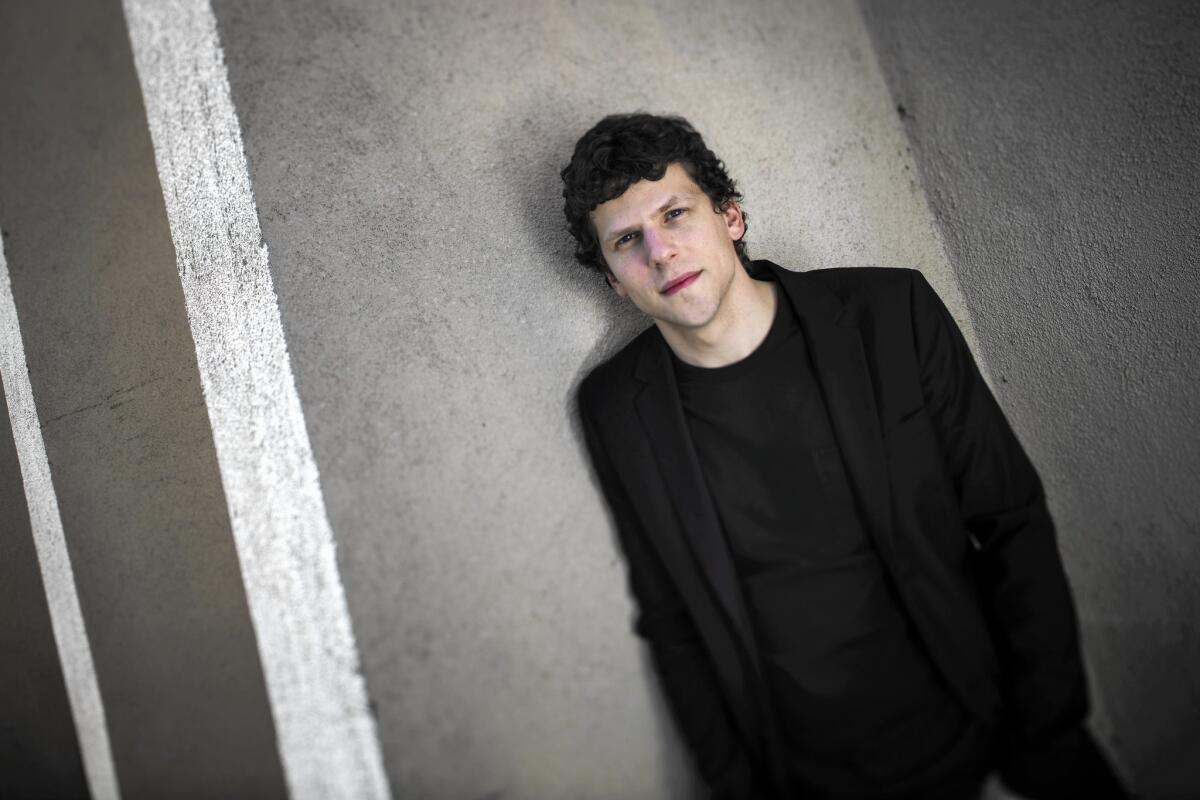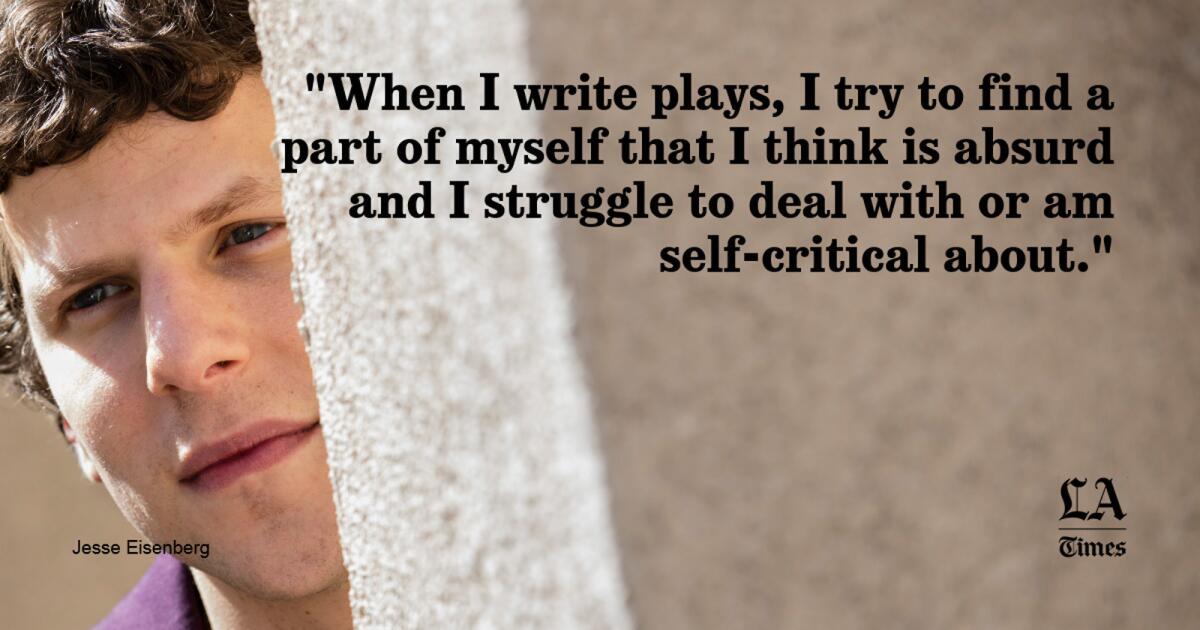Jesse Eisenberg a.k.a. Lex Luthor puts his powers to new use with his play ‘The Revisionist’

When 16-year-old Jesse Eisenberg received a cease-and-desist letter from Woody Allen’s lawyer, he knew he had a future as a writer.
The precocious teen had written a screenplay about Allen while attending a performing arts high school in New York City. People thought it was funny, so it got passed around, including to an agent, a manager and then eventually Allen’s lawyer, who was not amused.
“It was really exciting to be corresponding with Woody Allen,” recalled Eisenberg, now 32, while sitting in a trailer on the Warner Bros. back lot after a lengthy press day for his new film, “Batman v Superman,” in which he stars as supervillain Lex Luthor. “But it was in the form of a threatened lawsuit, so I put that script down and started writing other screenplays, because I felt confident in my abilities after that.”
SIGN UP for the free Indie Focus movies newsletter >>
In his early 20s, he gave one of his screenplays to friend and mentor Bob Odenkirk, who told Eisenberg he was wasting his time writing dumb Hollywood comedies. You’re a sensitive guy, Odenkirk told him, so write something personal. So Eisenberg wrote a play called “The Revisionist,” about an arrogant yet deeply insecure young novelist who tries to vanquish his writer’s block by staying with an elderly Jewish cousin in Poland.
That play’s West Coast debut begins previews Tuesday at the Wallis Annenberg Center for Performing Arts in Beverly Hills. The production stars the inimitable, Tony-winning stage actress Deanna Dunagan and the young, up-and-coming actor Seamus Mulcahy as the young writer, David. Eisenberg played David when the show opened in 2013 at the off-Broadway Cherry Lane Theatre in New York. Vanessa Redgrave played the cousin, Maria, a Holocaust survivor with plenty of unsettling revelations tucked away in her closet.
“These women are two of my favorite actresses,” Eisenberg said of Redgrave and Dunagan. “So this process has given me, as a writer, an opportunity to watch actors who are much better than me take on a role and intimately and thoroughly inhabit a character in ways that I as an actor have yet to do.”
Eisenberg is thin and wiry, with an intense way of speaking that conjures a millennial Allen. His words come in keenly articulate rushes, but he is quick to listen when someone else speaks. This listening is done with the same focused concentration as the talking. When he plucks his contact lenses out of his eyes and puts on wire-rimmed glasses, he looks every inch the writer that he is when he’s not acting. (His smaller, indie-minded film “Louder Than Bombs” opens in L.A. on April 8.)
In addition to contributing to the New Yorker’s humorous “Shouts & Murmurs” column, he has written two other off-Broadway plays: “Asuncion,” which premiered in 2011, and “The Spoils,” which opened in 2015 and will play in London beginning May 1. Eisenberg has starred in all three of his plays, not necessarily because he wanted to, but because he felt compelled to.
“I think my stage fright and fear of doing the play gets trumped by my fear that it won’t get done correctly,” he said, explaining that no matter how much he acts onstage, he can’t kick the feeling that something is about to go terribly wrong.
As much as it sounds as though Eisenberg can be a bit of a control freak with his plays, Robin Larsen, the director of “The Revisionist” at the Wallis, says he’s anything but. She has called him a number of times for advice, which he happily gives — but always with the caveat that he’s sure her solution will be just fine.
“As an actor-playwright, he’s written a very character-driven piece that I think actors really respond to and shine in,” Larsen said. “That’s really why I think Deanna Dunagan and Seamus Mulcahy wanted to do it. They recognized characters with full arcs that made emotional and visceral sense to them.”
Eisenberg writes what he knows, and what he knows is informed by a self-awareness that is so loaded, it borders on neurotic. The characters he often ends up creating are narcissistic, whiny know-it-alls who are hard to like and impossible not to watch.

Jesse Eisenberg
“When I write plays, I try to find a part of myself that I think is absurd and I struggle to deal with or am self-critical about,” Eisenberg said. “And then I put that quality in the character because I feel by virtue of writing about that character — writing about myself — I will ultimately try to defend that character.”
This creates the dichotomy of criticizing a person while also guarding him or her, and that, in turn, produces his most interesting characters, he said.
He first tried this technique when writing “The Revisionist,” which is based on his own experience of staying in a Polish town with a cousin, Maria, who saw family members killed in the Holocaust. At the time, Eisenberg was filming “The Hunting Party” in Croatia and feeling down about his role as the “tag-along, sidekick guy.”
“Over the course of the time with this woman, I realized that her plight was almost comedically juxtaposed to my convenient life, especially since I was the one experiencing all this inner trauma and turmoil,” Eisenberg said. “At the time, I was in college studying anthropology, and I was looking at the way we infantilize other cultures as powerful Americans, and I thought that would be a great theme for the play.”
In “The Revisionist,” David is uncomfortably condescending to Maria, which is how Eisenberg fears he had treated his cousin Maria simply because he was feeling low about “playing a role that I felt was a little nebbishy.”
Eisenberg said he is driven by a sense of mortification at his own behavior. The only way he can exorcise those feelings is to direct that mortification toward some sort of betterment through his writing for stage. Writing and acting in plays also allow him to interact with his audience in a way that film doesn’t. He pointed to the fact that “Batman v Superman” has substantive themes involving the nature of power, hegemony and xenophobia, but because the story plays out on a screen and not with live actors in the same room as the audience, there is a level of remove.
Eisenberg is excited that “The Revisionist” has taken on a life of its own without him at the Wallis. He feels perfectly comfortable watching Mulcahy claim the role he once inhabited, although he wasn’t completely hands-off when it came to this production. After watching a lot of casting tapes, he saw in Mulcahy the first person to play the role just how he had pictured it.
Eisenberg also was thrilled to find out from director Larsen that the play will be staged with the audience sitting on both sides of the stage. He finds a comforting and telling intimacy in watching the crowd react to the action. At the Wallis, Larsen said, the play is being staged in the smaller of the venue’s two theaters, and the setup will mean no audience member is more than 14 feet from the stage.
The only downside of not being onstage this time around, Eisenberg said, is that he can’t take the heat if something goes wrong.
“I don’t want my thing to be the thing that lets these people down,” Eisenberg said, proving that it’s not easy for him to relax in the theater, even when he’s just watching from the sidelines.
------------
‘The Revisionist’
Where: Lovelace Studio Theater at the Wallis Annenberg Center for the Performing Arts, 9390 N. Santa Monica Blvd., Beverly Hills
When: Previews start Tuesday; play opens Friday. 8 p.m. Tuesdays-Fridays, 3 and 8 p.m. Saturdays, and 2 and 7 p.m. Sundays. Ends April 17.
Tickets: $50
Info: (310) 246-3800, www.thewallis.org
Running time: 1 hour, 45 minutes (no intermission)
More to Read
The biggest entertainment stories
Get our big stories about Hollywood, film, television, music, arts, culture and more right in your inbox as soon as they publish.
You may occasionally receive promotional content from the Los Angeles Times.











